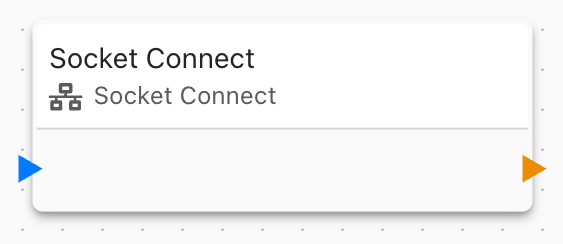Socket Connect
This block establishes a TCP/IP socket connection to a remote server. Use it to initiate network connections for custom protocols.

Overview
The Socket Connect block creates TCP/IP connections to remote servers, enabling custom protocol implementations and direct network communication.
Configuration
- Host: Remote server hostname or IP address
- Port: TCP port number to connect to
- Timeout: Connection timeout in seconds
- TLS/SSL: Enable encrypted connection
Connection Parameters
Configure connection settings:
Host
- IP address:
192.168.1.100 - Hostname:
server.example.com - Use variables for dynamic hosts
Port
- Standard ports: 80 (HTTP), 443 (HTTPS), 502 (Modbus TCP)
- Custom application ports
- Dynamic port selection
Timeout
- Connection establishment timeout
- Typical: 5-30 seconds
- Adjust based on network conditions
Connection Flow
Typical socket connection flow:
- Execute Socket Connect block
- Wait for connection establishment
- On Socket Event triggers on success/failure
- Send data with Socket Send
- Receive data with On Socket Data
- Close connection when done
TLS/SSL Connections
Enable secure connections:
- Encrypted data transmission
- Server certificate verification
- Secure protocol implementations
Required for:
- HTTPS communication
- Secure MQTT (port 8883)
- Protected APIs
- Sensitive data transmission
Connection Management
Manage socket connections:
- One connection per block instance
- Reuse connections for efficiency
- Close when no longer needed
- Reconnect on failure
Error Handling
Handle connection failures:
Common Errors
- Connection refused: Server not listening on port
- Timeout: Network unreachable or slow
- DNS failure: Cannot resolve hostname
- Certificate error: TLS validation failed
Error Recovery
- Retry with exponential backoff
- Try alternate servers
- Log errors for diagnostics
- Alert on persistent failures
Dynamic Connection
Build connection parameters dynamically:
- Load server address from settings
- Select port based on conditions
- Failover to backup servers
- Runtime configuration
Use Cases
Common socket connection scenarios:
- Connect to Modbus TCP devices
- Query remote databases
- Call REST APIs over TCP
- Custom protocol communication
- Industrial equipment integration
Connection Pooling
For multiple connections:
- Create separate Socket Connect blocks
- Manage connection lifecycle
- Implement connection pooling
- Monitor active connections
Network Requirements
Socket connections require:
- Active network connectivity
- WiFi, Cellular, or Ethernet
- DNS resolution (for hostnames)
- Firewall rules allowing outbound connections
Related Blocks
- Socket Send: Send data after connecting
- On Socket Data: Receive data
- On Socket Event: Monitor connection status
Protocol Examples
Connect to various services:
Modbus TCP
- Host: PLC IP address
- Port: 502
- No TLS
HTTPS API
- Host: api.example.com
- Port: 443
- TLS enabled
Custom Protocol
- Host: Custom server
- Port: Application-specific
- TLS optional
Performance
Connection performance tips:
- Reuse connections when possible
- Set appropriate timeouts
- Implement connection caching
- Monitor connection health
Linking to Settings
Socket parameters can be linked to settings for:
- Runtime server configuration
- Port selection
- Timeout adjustment
- Environment-specific endpoints
Troubleshooting
Common connection issues:
- Cannot connect: Check host, port, and network
- Timeout: Increase timeout or check network latency
- DNS error: Verify hostname spelling and DNS servers
- TLS error: Check certificate validity and system time